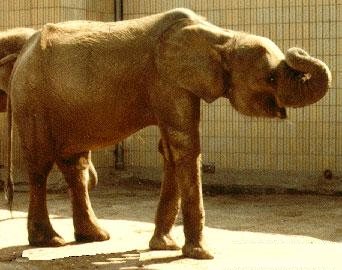|
| Query: loxodonta | Result: 1st of 235 | |
African Forest Elephant (Loxodonta cyclotis) - Wiki
| Subject: | African Forest Elephant (Loxodonta cyclotis) - Wiki
| |

| Resolution: 342x270
File Size: 23179 Bytes
Upload Date: 2006:12:28 23:13:01
|
African Forest Elephant
From Wikipedia, the free encyclopedia
[Photo] Fotograf: Dan Koehl http://sv.wikipedia.org/wiki/Anv%C3%A4ndare:Dan_Koehl Plats: Frankfurt Zoo, 1976 Art: Loxodonta cyclotis
The African Forest Elephant (Loxodonta cyclotis) was until recently considered a subspecies of the African Bush Elephant (Loxodonta africana); however, DNA testing has now shown that there are in fact three extant elephant species: the two African types (formerly considered to be different populations of a single species, the African Elephant) and the South Asian species, known as the Indian or Asian Elephant. The North African elephant of Hannibal fame was a now-extinct fourth species or a subspecies of the Forest Elephant (Loxodonta (africana) pharaoensis); it disappeared around the 1st or 2nd century CE. The disputed Pygmy Elephants of the Congo basin, often assumed to be a separate species (Loxodonta pumilio) by cryptozoologists, are probably Forest Elephants whose diminutive size and/or early maturity is due to environmental conditions.
Differences include the African Forest Elephant's long, narrow mandible (the African Bush Elephant's is short and wide), its rounded ears (an African Bush Elephant's ears are more pointed), different tusks, and considerably smaller size. The Male African Forest Elephant rarely exceed 2.5 metres (8 feet) in height, while the African Bush Elephant is usually over 3 metres (just under 10 feet) and sometimes almost 4 metres (13 feet) tall.
Late in the 20th century, conservation workers established a DNA identification system to trace the origin of poached ivory. It had long been known that the ivory of the African Forest Elephant was particularly hard, with a pinkish tinge, and straight (whereas that of the African Bush Elephant is curved). The DNA tests, however, indicated that the two populations were much more different compared with previously appreciated???indeed, in its genetic makeup, the African Forest Elephant is almost two-thirds as distinct from the African Bush Elephant as the Asian Elephant is.
http://en.wikipedia.org/wiki/African_Forest_Elephant
| The text in this page is based on the copyrighted Wikipedia article shown in above URL. It is used under the GNU Free Documentation License. You may redistribute it, verbatim or modified, providing that you comply with the terms of the GFDL. |
|
Comments |
|---|
| | Guest |
|
African Pygmy Elephant
From Wikipedia, the free encyclopedia
The (African) Pygmy Elephant (Loxodonta pumilio) is said to be a secretive species, related to the African Forest Elephant and native to the Congo. In cryptozoology it is sometimes argued to be a separate species. A 2000 paper by the mammalogists Colin Groves and Peter Grubb argued that this species did not exist; "Pygmy Elephants" are merely extremely small or immature examples of the African Forest Elephant. Genetic analysis did not support the "Pygmy Elephant" concept either (Debruyne et al., 2003). |
| | Guest |
|
| this elephant is ugly |
| | bullshit |
|
| this elephant look like you starve it youll fucked up |
| | Guest |
|
| Loxodonta cyclotis (Matschie, 1900) – African Forest Elephant |
^o^
Animal Pictures Archive for smart phones
^o^
|
|
|